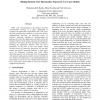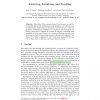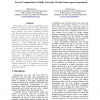91 search results - page 7 / 19 » Negotiating and Understanding Information Systems Requiremen... |
AAMAS
2004
Springer
13 years 7 months ago
2004
Springer
Our goal in this paper is to introduce and motivate a methodology, called Tropos,1 for building agent oriented software systems. Tropos is based on two key ideas. First, the notion...
DSN
2008
IEEE
13 years 9 months ago
2008
IEEE
Software vulnerabilities are the root cause of a wide range of attacks. Existing vulnerability scanning tools are able to produce a set of suspects. However, they often suffer fro...
IWPC
2002
IEEE
14 years 13 days ago
2002
IEEE
While code understanding is the primary program comprehension activity, it is quite challenging to recognize the application requirements from code, since they have usually been o...
ER
2007
Springer
13 years 11 months ago
2007
Springer
Abstract. Definitions of the concepts derived from the goal concept (including functional and nonfunctional goal, hardgoal, and softgoal) used in requirements engineering are discu...
HICSS
2009
IEEE
14 years 2 months ago
2009
IEEE
New systems can be created by assembling a set of elementary services provided by various stakeholders in a service composition. Service composition is not a trivial endeavor and ...



